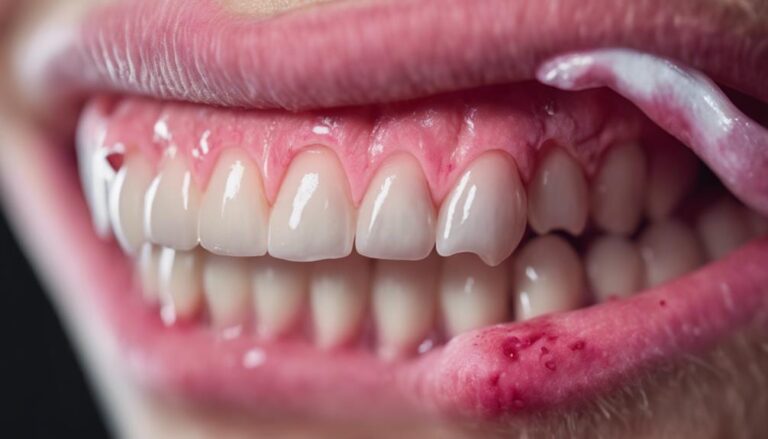When gum disease strikes, it sets off three main reasons for bad breath. To begin with, bacteria in the mouth build up, causing gum disease and contributing to bad breath. Next, inflammation of the gums due to bacterial plaque leads to redness, swelling, and bad breath. Lastly, foul odors result from bacterial growth and breakdown of gum tissue, emphasizing the importance of proper oral hygiene. Taking care of these factors is essential for combating bad breath caused by gum disease. Understanding these triggers is critical for fresh breath and overall oral health.
Key Takeaways
- Bacterial growth in gum pockets releases foul odors.
- Plaque buildup along the gumline harbors malodorous compounds.
- Inflammation from gum disease exacerbates bad breath.
- Dry mouth allows bacteria to thrive, worsening bad breath.
- Digestive issues are accentuated in individuals with gum disease, leading to bad breath.
Bacterial Build-Up in Mouth
Bacteria accumulating in the mouth can contribute greatly to the development of gum disease and subsequent bad breath. Proper oral hygiene is essential in preventing plaque accumulation, which provides a breeding ground for harmful bacteria. Plaque is a sticky film of bacteria that forms on teeth and gums and, if not removed through regular brushing and flossing, can lead to gum inflammation and disease.
Maintaining good oral hygiene practices, such as brushing twice daily with fluoride toothpaste and flossing at least once a day, is necessary to prevent the buildup of plaque. Inadequate oral hygiene allows bacteria to thrive, leading to the release of foul-smelling gases that cause bad breath. Regular dental check-ups and professional cleanings also play an important role in removing plaque and tartar that can’t be effectively eliminated through home care alone.
Inflammation of Gums
The presence of inflammation in the gums can signal the progression of gum disease and contribute to persistent bad breath. When gums become inflamed, it’s often a sign of the body’s response to bacterial plaque accumulation along the gumline. This inflammation is the body’s way of trying to combat the bacteria present, leading to redness, swelling, and sometimes bleeding of the gums. Inflammation in the gums can also indicate the presence of gingivitis, the early stage of gum disease characterized by gum inflammation due to poor oral hygiene practices.
Maintaining good oral hygiene practices is vital in preventing and managing gum inflammation. Regular brushing, flossing, and dental check-ups are essential to keep bacterial plaque at bay and promote gum health. Neglecting oral hygiene can allow bacteria to thrive, leading to gum inflammation and potential progression to more severe forms of gum disease. Therefore, prioritizing oral hygiene is key to preventing the inflammation of gums and the associated bad breath that can result from it.
Release of Foul Odors
Upon the development of gum disease, the release of foul odors from the mouth can be attributed to various factors associated with oral health. The foul odors emanating from the mouth in individuals with gum disease are often a result of:
- Bacterial Growth: The buildup of bacteria in the mouth due to poor oral hygiene practices can lead to the production of volatile sulfur compounds, contributing to bad breath.
- Plaque Accumulation: When plaque accumulates along the gumline, it provides a breeding ground for bacteria that release malodorous compounds.
- Gum Tissue Breakdown: As gum disease progresses, the breakdown of gum tissue can create pockets where food particles get trapped, promoting bacterial growth and odor.
- Dry Mouth: Reduced saliva flow, often linked to certain medications or medical conditions, can exacerbate bad breath by allowing bacteria to thrive.
- Digestive Issues: Problems within the digestive system can sometimes manifest as bad breath, which may be accentuated in individuals with gum disease.
Understanding these factors can help in addressing the root causes of bad breath associated with gum disease.
Frequently Asked Questions
How Can Gum Disease Affect Overall Oral Health?
Maintaining good oral hygiene is vital for preventing gum disease and its consequences on overall oral health. Regular brushing, flossing, and dental check-ups are essential for prevention and early detection.
Are There Any Home Remedies to Prevent Gum Disease?
Keeping my gums healthy is essential. I rely on natural remedies like oil pulling and aloe vera to prevent gum disease. Diligent oral hygiene, including regular brushing and flossing, is important for maintaining excellent oral health.
Can Bad Breath Be a Sign of Other Health Issues?
Bad breath can signal underlying conditions like respiratory infections or liver issues. Maintaining good oral hygiene is essential. Brushing, flossing, and regular dental check-ups can help identify and address potential health concerns early on.
What Role Does Saliva Play in Preventing Bad Breath?
Saliva is essential for preventing bad breath by washing away bacteria and food particles. Maintaining good gum health is key to stimulating saliva production. When gums are healthy, saliva can work its magic effectively, keeping breath fresh.
Can Certain Medications Contribute to Gum Disease and Bad Breath?
Certain medications’ side effects can contribute to gum disease and bad breath. It’s vital to maintain excellent oral hygiene practices to counteract these effects. Regular brushing, flossing, and dental check-ups are essential for overall oral health.
Conclusion
To sum up, gum disease can trigger bad breath through bacterial build-up, gum inflammation, and the release of foul odors. By addressing these underlying issues, individuals can improve their oral health and combat bad breath effectively.
Just as a well-maintained garden flourishes with care and attention, so too can our oral hygiene bloom when we prioritize proper dental care.
Remember, a healthy smile starts with healthy gums.






